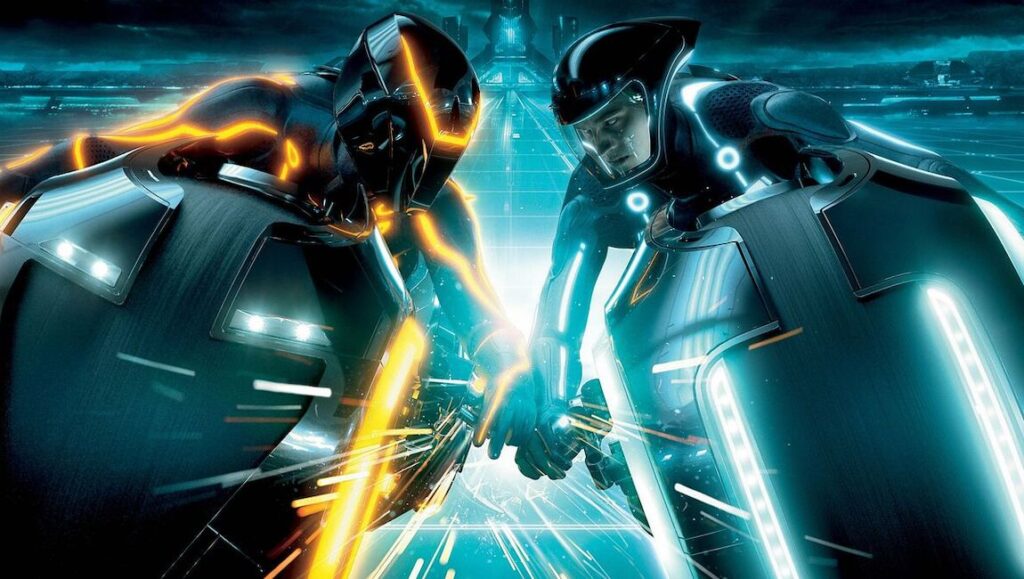But let’s not fool ourselves into believing that the original TRON was ever anything more than a curious novelty with some then-groundbreaking special effects. The story of video game designer Flynn (Jeff Bridges) who, while attempting to exact revenge on the software corporation that stole his work, is actually physically transported into his creation held a lot of sway over a yet-to-blossom geek culture. Kids playing Atari and blowing quarters at the arcade finally got the chance to see what it might be like to go inside their favorite games. Nearly 30 years later, we have TRON: Legacy, a gigantic, self-serious, conceptually baffling sequel that, much like its predecessor, is mostly a giant laser light show with a similarly boneheaded narrative. This time Flynn’s son Sam enters the game world (called “the Grid”) to search for his long lost father, who disappeared years earlier.
Immediately upon his arrival, Sam is thrown into “the games,” basically the same lightcycle races and deadly Ultimate Frisbee fights we saw in the original TRON, but augmented with 2010 CGI, a pulsing score by Daft Punk, and IMAX 3-D. This ten-minute stretch of the movie is inarguably the most entertaining, since it is the film’s sole reason for being: “What if TRON looked like it was made today?” The answer is that it would be cool for a few minutes. When Sam finally does find his pops (Bridges reprises his role) he also finds out that there’s an evil CGI Jeff Bridges, a program created by the original Flynn named Clu, running around playing dictator. Clu is a fully CG creation, representing a Bridges in his thirties. He’s occasionally pretty impressive, until he moves or speaks, at which point he looks like a cartoon (yet another aspect of this film that seems entirely half-assed). His ridiculous plan involves bringing thousands of soldiers from the Grid into the real world, for some reason and by some means that are completely unexplained.
That’s because to delve further into the plot of TRON: Legacy is not only pointless but nearly impossible, as it consists mostly of expository scenes delineating a story that takes place chronologically between the two films. Suffice it to say that when Sam arrives on the Grid, he (and the audience) is then treated to speech after info-dumping speech alerting us to all the important stuff that has gone on in computer-land over the last two decades. It grinds the film to a halt, leaving only the visuals to carry one through to the end, and frankly, there’s so little variety to this aspect that it too becomes tiresome and repetitive. Instead, there’s a formulaic last-act plot about chasing some important disc, making this elaborate fantasy set in an amazing universe no more interesting than an episode of 24.
Okay, you say, but the original TRON wasn’t so big on narrative either. It was a film of ideas. Maybe, but not very good ones. The idea of being actually physically transported into a video game seemed interesting in 1982, when most people didn’t know how computers worked. But today, post The Matrix and Neuromancer and, well, the whole entire Internet, that idea is not only ridiculous but a massive narrative distraction. Much like Pixar’s film Cars, (where maybe the cars have babies somehow?) a great deal of time watching TRON: Legacy is spent wondering about things like the characters’ need to eat food, or why, if Bridges’s all-powerful creator can somehow manipulate the game world, he doesn’t just do whatever he wants. A lengthy sequence takes place in a nightclub, which makes me wonder just why these computer programs need entertainment, why they seem to want to drink beverages, and basically what purpose a nightclub serves in this particular world.
That’s not to suggest that there isn’t anything at all going on in TRON: Legacy but merely that any fleeting ideas you may notice simply can’t be taken seriously because the world-building involved is so poorly thought out. The story seems to hinge on the spontaneous creation of a race of artificially intelligent programs, something both Good Bridges and Evil Bridges seem to think is incredibly significant. We’re never told why, though, beyond some cursory talk of their potential effect on “Science! Technology! Religion!” It’s nonsense. And throw in an action finale lifted right out of Star Wars (which only distracted further; how come the neon jet planes in the game world produce smoke when damaged?), and you’re left exactly where you started: In an expensive, calculated attempt to hit a demographic. TRON: Legacy is a lazy nostalgia blast given an opportunity, in the form of Disney’s checkbook, to pretend to be the real thing.


Comments are closed.